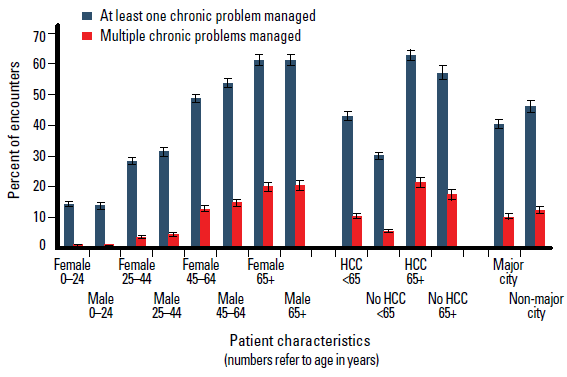Chronic conditions managed in general practice were defined according to the work of O’Halloran et al.2 Between April 2011 and March 2012 there were 98 400 encounters recorded in the BEACH (Bettering the Evaluation and Care of Health) program, of which 41.6% included at least one chronic problem managed. At 10.8% of encounters, two or more chronic problems were managed.
The percentage of patients being managed for at least one chronic problem was significantly higher for male patients aged 25–64 years than for female patients in that age group (Figure 1). There was no difference between males and females in the proportion being managed for two or more (multiple) chronic problems. The percentage of encounters with at least one chronic problem managed was lowest for patients aged 0–24 years (14.3% of females, 13.7% of males) then rose significantly through all age groups to 61.1% of encounters with patients aged 65 years and over. Multiple chronic problem management also rose significantly across age groups: from less than 1% of encounters with those aged less than 25 years to about 20% of encounters with patients aged 65 years or over.

Figure 1. Chronic problems managed
Ι = 95% confidence intervals
Government healthcare cards (HCC) are issued to people on limited incomes and are therefore an indication of socioeconomic status. Encounters with HCC holders were significantly more likely to include management of at least one chronic problem and multiple chronic problems. A comparison of major city and non-major city encounters also found that the proportion of patients being managed for multiple chronic conditions was significantly higher for those not living in a major city than for patients living in a major city.
Our results show that as the Australian population ages, patients with multiple chronic conditions will require increasingly complex management from the GPs involved in their care.
Conflict of interest: none declared.
Acknowledgements
The authors thank the GP participants in BEACH and all members of the BEACH team. Funding contributors to BEACH from April 2011– March 2012: Australian Government Department of Health and Ageing; AstraZeneca Pty Ltd (Australia); CSL Biotherapies Pty Ltd; GlaxoSmithKline Australia Pty Ltd; Merck, Sharp and Dohme (Australia) Pty Ltd; Novartis Pharmaceuticals Australia Pty Ltd; Pfizer Australia; Sanofi-Aventis Australia Pty Ltd.